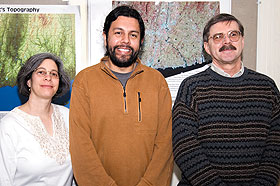  |
| HOME | THIS ISSUE | CALENDAR | GRANTS | BACK ISSUES | < BACK | NEXT > |
Graduate fellowships help students develop multidisciplinary skills
| ||||
| The environmental problems of the 21st century require solutions that bridge traditional academic disciplines, according to Michael Willig, director of the Center for Environmental Sciences and Engineering (CESE). The Center aims to help the next generation of researchers gain the skills needed to develop such solutions by offering awards to graduate students for multidisciplinary environmental research. The awards encourage students to apply the resources of more than one discipline to a given problem by requiring that each award recipient have two faculty mentors from different disciplines – and preferably different departments – who will collaborate in the research. “Emerging environmental problems—such as the loss of biodiversity, environmental illnesses, and the effects of climate change—and their solutions do not fit into neat disciplinary pigeonholes,” says Willig, a professor of ecology and evolutionary biology. “To meet the challenges posed by these multidimensional environmental issues, the new generation of researchers will need state-of-the art tools, perspectives, and capabilities to engage in collaborative, multidisciplinary work.” The first set of awards, given in 2007, went to 25 graduate students in the College of Agriculture and Natural Resources, the College of Liberal Arts and Sciences, and the School of Engineering. Their projects involved a total of 17 departments, including such diverse fields as anthropology, chemical engineering, ecology and evolutionary biology, environmental engineering, marine sciences, and materials science. Award recipient James Reinhardt, a doctoral student in marine sciences, investigated the spread of an invasive sea squirt that threatens the ecological health of Long Island Sound. The sea squirt can cover enormous areas of the sea floor, keeping native species from accessing their food and habitats. Reinhardt worked with mentors Robert Whitlatch, professor of marine sciences, and Montgomery Shaw, distinguished professor of chemical engineering. Besides applying methods of marine sciences to conduct microscopic analyses, Reinhardt used techniques and equipment from materials science to measure changes in a colony’s tensile strength – its ability to stretch without breaking. Reinhardt states, “The award forced me to step outside the usual boundaries, to think in an interdisciplinary way.” As a marine sciences student, he had never taken an engineering course, but the award helped him build beneficial relationships with researchers in engineering and gain access to new knowledge and resources, such as high-tech engineering equipment.
Whitlatch, one of Reinhardt’s mentors, is enthusiastic about the benefits for students and faculty alike. “The beauty of this program is that it brings together individuals of different backgrounds and interests,” he says. Reinhardt’s project not only generated useful information about the material properties of the invasive sea squirt, but also opened avenues for future interactions between researchers in marine sciences and materials science, Whitlatch adds. J. Pablo Arroyo, a doctoral student in ecology and evolutionary biology, is combining the disciplines of ecology, forestry, and remote sensing to study the effects of logging on tropical rainforests. Arroyo, who says his work tries to focus on multidisciplinary approaches whenever possible, worked with mentors Robin Chazdon, professor of ecology and evolutionary biology, and Daniel Civco, professor of natural resources management and engineering. He says the CESE award enable him to analyze data from the field and from satellite and aircraft sources. Some of his research will be published as a chapter in a forthcoming book on multidisciplinary applications of remote sensing. Thanks to the CESE awards, students have applied multidisciplinary approaches to the investigation of a host of pressing environmental issues, including alternative energy sources, pollution prevention, biodiversity, climate change, genetic engineering, and sustainability. Besides conducting research, award recipients participate in a multidisciplinary graduate colloquium, write a short summary of the project for the public, and produce a final report or poster that summarizes their accomplishments and future directions. The research summaries are available at www.cese.uconn.edu. CESE expects to offer another 20 to 25 awards in 2008. The awards are open to graduate students throughout the University to engage in collaborative environmental research during the summer. The new awards will be announced by March 15. |
| ADVANCE HOME UCONN HOME |

